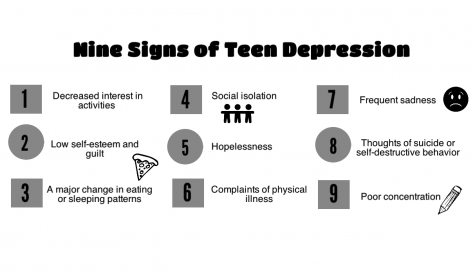Depression takes a toll on teenagers
October 3, 2014

Sadness, irritability and withdrawal are things most teenagers feel on occasion. However, these feelings could suggest something much deeper. Feelings of loneliness is thought of as normal during teenage years, so Emma,whose name was changed to protect her privacy, never thought much of her change in attitude.
Emma has been battling depression for most of her teenage life, fading in and out from “okay” days to “a nightmare” some days, Emma even feared for her life on days she felt hopeless. The worst thing however was not the tugging feeling of being worthless, but of accepting that she had depression and going forward with treatment.
“The hardest step (of depression) is recognizing that you need help. The second is opening yourself up to talk and the final is allowing change,” school psychologist Eliana Lichtman said.
Before accepting the issue, Emma had mood swings at home and seemed reserved at school. Although she engaged with friends, at times friends would notice her spacing out and silent for a complete day without reason. Without knowing what was happening, Emma and her friends had no clue what was really wrong because the typical signs of depression were blurred.
According to nlm.nih.gov also known as MedlinePlus (directed by Dr. Donald A.B. Lindberg), teenagers typically feel more irritable than sad while burdened with thoughts of worthlessness, making them vulnerable to criticism and rejection. Opposed from general stereotypes, teenagers tend to rely on their friends instead of withdrawing from said friendships.
Although this may be true, they may socialize less and pull away from their parents. While a teenagers’ mind is stuck on their issues, they tend to forget about their school work or no longer care. Emma, however was exempt from this.
“I started to notice that she was less talkative, when we asked what was wrong she only replied with ‘nothing, I’m fine’ we thought maybe she had some issues at home or as simple as a bad week, so we always let it go,” said her friend Nicole, whose name was also changed to protect her privacy.
As depression worsens, a teenager becomes more irritable and impulsive. This tension can lead to rash decisions such as running away, drug abuse and violence. Instead of acting out to cope, some may form negative mental thoughts.
In fact, according to Litchman, students with depression can fall back in their grades, and miss more school. These issues can range from skipping class, lack of motivation/interest and even dropping out of school. In severe cases, it can lead to suicidal thoughts and self harm.
Emma’s first year of high school was rocky, trying to figure out what was wrong Emma became afraid of what might happen if she didn’t tell anyone. With new things to worry about she started to forget about school and difficulty listening to lectures. As a result, Emma’s grades went into a downward spiral, she started to feel worse and nervous about quizzes and tests and even started to form anxiety about said activities.
Negative mental thoughts can lead into problems at school and low self esteem. These two internal problems can lead to external problems such as running away, violence and drug/alcohol abuse. At any point, help is a necessity to getting healthy.
“Emma kept letting her grades drop and I didn’t know why, it wasn’t until she told me what was going through her mind I tried to convince her to see a psychologist, but I didn’t know how to say it without offending or hurting her,” Nicole said
 In terms of helping teens, speaking to them might spark an issue. A teenagers gut may be to not seek help or that nothing is wrong and even ashamed. However, the actions of a disturbed teenager can be signs of a problem, even if it turns out not to be depression. There are precautions and steps, according to MedlinePlus, as well as Litchman about talking to a depressed teen.
In terms of helping teens, speaking to them might spark an issue. A teenagers gut may be to not seek help or that nothing is wrong and even ashamed. However, the actions of a disturbed teenager can be signs of a problem, even if it turns out not to be depression. There are precautions and steps, according to MedlinePlus, as well as Litchman about talking to a depressed teen.
Some of these steps include offering support instead of criticism. According to Litchman, waiting and letting the teen express their feelings then trying to understand those feelings is a good steep. Other steps include letting them know that you’re there for them unconditionally offers confidence and trust along with support through their daily routine and keeping any harmful products away from their reach. A common mistake with helping someone is asking too many questions, causing teenagers to feel like they’re being crowded.
“In the process of getting help, some patients don’t show up after they’ve made appointments,” Lichtman said “However, I’m here (at school) and I can give resources. ”
When Nicole convinced Emma to tell her mother, Emma was set up for a psychiatric evaluation later that month, a weight was lifted off their shoulders.
“When I was diagnosed they told me I had mediate depression and mild anxiety, but told me that if I didn’t get therapy or medication it could evolve into something deeper and if I couldn’t get my anxiety under control it’d come back in a bad way.” Emma said. “I was reluctant at first but they told me about the road I was going and then I noticed I had to get help.”
Weekly sessions was mandatory in Emma’s particular clinic in order to be under anxiety and antidepressant medication. Sessions included anxiety exercises and getting to the root of what made her depressed in the first place.
“I’d say that therapy was the best thing that happened to me.” Emma said, “It helped me get in touch with myself and now I know how to deal with feelings of anxiety and how to divert my thoughts away from negative feelings.”

















